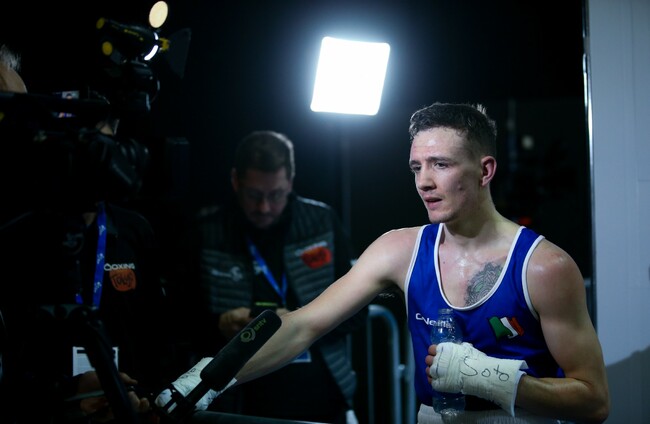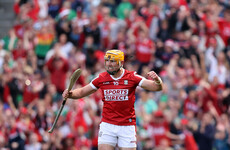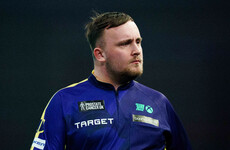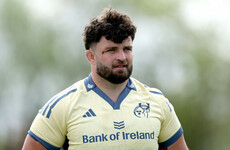A COUPLE OF weeks on from qualifying for an Olympics for which he now has more than a year to prepare, Brendan Irvine, like most of us, finds himself at a loss as to what to do with his time.
So, like plenty of people in their 20s who have temporarily moved back in with parents as society battens down the hatches, the Belfast flyweight has turned his hand to the paintbrush.
The mother’s house needed a new lick of colour, and it’s about halfway towards looking pristine when Irvine answers the phone and downs tools for a bit.
“I did all the garden the other day,” he says. “So… It was literally: ‘What can I do next?’
The lawn already resembles the 18th at Augusta.
“I think my car is the shiniest on the street, as well,” he laughs. “I mean, I think it always is anyway, but it’s just that extra wee bit shiny, now.”
The relative tranquillity of life admin is a far cry from London where, last month, an elated Irvine booked his seat on the plane to Tokyo and a place at his second Olympics at the age of just 23. But more pertinently it is a departure from the madness of a week which saw 318 boxers from 43 countries, all of their backroom teams and, for the first few days at least, paying fans, converge at London’s Copper Box Arena for the inevitably omnishambolic European Olympic qualification tournament.
The event was organised by the IOC’s ‘Boxing Task Force’ in place of amateur boxing’s disgraced world governing body, AIBA, and in the face of a virus that was later confirmed to have been taken home from London by three Croatian fighters, two Turks and one of their trainers, and a member of the Russian coaching saff.
Irvine — thankfully unscathed, as were his 12 Irish team-mates — was one of the last combatants to duck under the top rope before the tournament’s postponement on the Tuesday night by which stage 16 of 77 Olympic spots had been secured, one of them belonging to Ireland’s two-time European medalist.
And yet nearly all of this had been blocked out by Irvine himself who, for his own sanity, had the blinkers on until he bounded into the squared circle.
“Literally, I was just trying to stay focused on the boxing — not even thinking about whether or not the tournament would be cancelled,” he says. “To be honest, I wasn’t even thinking about if my [first] fight was going to be for Olympic qualification.
I was off social media for about five days before the competition [while away at training camp], so I hadn’t seen a whole lot. I knew people back home were on lockdown or whatever; I knew the place was going mad, everyone trying to clear shops out and stuff like that. But what I was hearing was off Mummy or my girlfriend. They were asking me if the tournament was still happening because they were concerned; they were worried that something could happen over there [in London] because we were in the midst of every country in Europe competing. It was a high-risk tournament. But I was just so focused on the boxing, it’s like you become a different person; you’re just zoned in on what you’re there to do, and that’s it, really, like.
The social-media blackout wasn’t mandatory but recommended at a team meeting in Dublin prior to the Irish squad’s departure. It’s not something Irvine feels the need to do often but he made the call to go off-grid on this occasion, he says, in a bid to narrow his vision towards the task at hand. Pandemics can be pretty distracting, in fairness.
“That night in the hotel, I just logged off everything. I deleted all the apps off my phone and my iPad. I bought three books in the airport and I had one in my bag.
“I read a full back in two days and I’m not a reader, like. It was actually Andy Lee’s book [Fighter] — it’s a great book. It really is.”
Pandemics can be fairly tedious, too, as Irvine has since learned while dipping his brush into the world of home improvement. But then, Olympic athletes and those who aspire to become so are better equipped than most of us to endure lockdown conditions: they’ve been there, got the tracksuits.
“Well, Aidan Walsh has an Xbox,” Irvine says of the Belfast welterweight, his Irish team-mate. “It’s a console but it’s like a briefcase, and you put the console into the briefcase and there’s a TV and all in it. It’s class. So, in London, me and him were in the room playing Xbox — or else he was playing Xbox and I was reading my book.
“And even when we’re staying down in Dublin, there’ll be a bit of Xbox. It makes the nights fly, because otherwise from the evening time onwards, you wouldn’t know what to be doing with yourself.”
Call of Duty: Modern Warfare, in case you’re wondering.
“And actually, the coaches would play it a wee bit too. Not all of them, not all of them… But when we’re staying in Dublin, Eoin Pluck [S&C] would play it a bit, and John Conlan [trainer] enjoys a bit too… And he’s very, very good!” Irvine says of Conlan, father of former amateur star Michael and professional world-title challenger Jamie.
“John’s very, very good at it,” he reiterates, the emotional scars from having his arse handed to him on COD by his mates’ Da laid bare in haunting fashion.
And it was sharpshooter Conlan, with whom Irvine is especially close, who informed him after the final bell of his Tokyo-sealing victory that his fight would be among the last in London.
It speaks to Irvine’s laser focus on the day that thanks to a concerted effort by all of the coaching staff — one led by team psychologist Kevin McManamon, known to most as a seven-time All-Ireland football winner with Dublin — he was oblivious to the news of the tournament’s cancellation.
This was key for several reasons but chief among them was that Irvine had been selected by Bernard Dunne as Irish captain, and the lead-up to his own potentially decisive fight was scarcely the time for his mind to become weighted with sympathy for several gut-wrenched team-mates whose own qualification bids had been kicked down the road despite weeks of arduous preparation.
Thankfully, McManamon is as quick-thinking on his feet as he is impactful when letting a football fly off one of them.
“As soon as I got out of the ring, John said to me: ‘The whole thing’s over. At least you’ve qualified,” Irvine recalls. “It was just as well he told me then, as well, actually, because I had a load of media to do after.
“But I didn’t actually know it was going to be cancelled as I was going into the ring. The coaches were trying to keep it from me.
When I was walking into the arena, we’d gotten friendly with the bus driver and he turned to Kevin, the psychologist, and said, ‘The tournament’s finished from today — it’s the last day.’ And Kevin was like, ‘Ehhh, ahhh, no, no’, trying to hide it from me. I goes to Kevin, ‘What did he say?’ And Kevin says, ‘Ah, nothing — he’s not making any sense.’ So, I didn’t think much of it. And even when I got into the warm-up and stuff, I saw everybody whispering. But it was for the best that it was hidden from me, like.
“We all had a team meeting at the end and it was kind of, just, like, we were suddenly going home. They [the coaches] were like: ‘Look, don’t be losing hope. This tournament is going to get finished; it will happen — it’s just a matter of when.’ But I think people were always going to be disheartened.
Like, I was on a high, just after qualifying. I’d went there to do a job and I’d gotten my chance to do it. So, I couldn’t imagine how some of the team must have felt when they were there for a week and they didn’t even get a fight. They were absolutely heartbroken, like. I could see it in their faces, some of them — proper devastation.
“And the team was flying,” Irvine adds. “The team was bouncing. I 100% believe we would have gotten near enough to a full team qualified. They were just in great form, like. But it’s just a matter of when this goes ahead again. They’ll still fight whoever they were meant to fight, and that will be it.
“And we needed to get out of there just to be safe — I think everyone realised that. We’ve seen since how quickly the thing has spread, and your health is your wealth at the end of the day.”
The Irish team have received training kits to keep things ticking over at home in the meantime, and the boxers remain in touch with each other in a WhatsApp group. They’re contacted by coaches via Zoom for official check-ins, while John Conlan gives Irvine and others the odd buzz over the phone for a chat.
It’s a weird time but one during which, unlike his peers, Irvine at least has the certainty of having secured his place at what will now be known as Tokyo 2021.
And he sells himself short, too, in claiming he couldn’t imagine how several members of the Irish team must have felt when the proverbial hit the fan in London: Irvine has over the past two years become about as intimate with uncertainty as most boxers can bear.
The well wishes, comments-section congratulations and applause emojis a few weeks ago were proudly received but in many cases sent by people oblivious to the suffering he has endured in near silence in order to position himself to warrant them.
His battles with injury were fought and won away from the glare of phone screens to the point that he was, to some extent, a forgotten man, all of which accentuated his spectacular reintroduction in London when he joined exalted company in becoming a two-time Irish Olympian.
“I was out of the ring, near enough, for the guts of a year and a half,” he says.
Aw, it’s… It’s… I can’t even describe it, really, the shit I’ve been dealt over the past year and a half, two years. It was like one thing after another.
“Before the [2018] Commonwealth Games, I tore a ligament in my hand. I got an injection to settle it down, competed in the Commonwealths and got silver. I came home and had a fight against India, it flared up, and the decision was made to get it operated on.
“Everything was grand. I was getting back to full fitness. I competed in New York [March 2019] and it was grand. I had a fight out in Germany [Chemistry Cup, April 2019] and I got beaten, but I was happy enough with my performance — it was just a fight to test the water and make sure everything was okay. So, I was selected, then, for the European Games in Minsk in June.
We had a camp in Belfast. I was absolutely flying, some of the best spars I’ve ever sparred. And in the second-last spar of the whole camp, I fell over. I got up and sparred on at the time, but when I got out of the ring I was limping. And it was actually my club coach, Ralph [McKay], who was up watching the sparring, who said: ‘You all right?’ I said: ‘What do you mean?’ And he says: ‘You’re limping.’ I didn’t even notice.
A few trips to the physio, a sit-down with a podiatrist, an MRI and, finally, a CT scan later, it was discovered that Irvine’s foot was fractured. Forget about Minsk, for starters.
Again, I can’t even describe the feeling. I literally just broke down in the place. All of those weeks and weeks trying to get back to full fitness, and I was finally there, only to get pushed back down again. It was probably the hardest thing I’ve ever dealt with on a personal level.
“So, to overcome all of those obstacles and to qualify for the Olympics, there, in London you know…
See, I think people probably just thought: ‘He’s after giving up boxing — he’s jacked it in’, or ‘he’s had enough’. But I was training every day, just doing whatever I could. I spent most of my time in Jordanstown or in my home club [St Paul's BC], where I was doing pads, static, near enough to every day — in a boot. I was doing strength and conditioning three days a week. I was swimming three or four times a week — I actually did a swimming course and became a lifeguard during all of that time out. But a lot of people might think I took time away from boxing, and I didn’t.
Nobody apart from my family and my coaches knows the shit I went through. But at the same time, the only thing they can tell you is that it’s going to get better — and nobody even knows if it is going to get better. Like, at one stage, I was sort of told that it mightn’t be better. I was in and out of the boot: in it for eight weeks, out for four, back into it for four, and so on.
A month in, a month out. One step forward, one step back. Going nowhere.
He can laugh, at least, about the not-so-fashionable shoes he had to wear when he was out of the boot and going somewhere — like, say, to the shop — and the looks he used to get as a result. “What can you do?”
But he adds, rather more seriously: “You’re always thinking: ‘What am I going to do if this doesn’t get better?’ And that’s maybe why I started thinking about doing the lifeguarding and stuff — I did a few shifts as a lifeguard in the local leisure centre while I was on the mend because you just can’t be sure.
“Like, it would have been easy to just throw the head up because believing everything will be okay without any real evidence is hard to do. It was just a case of generally trying to tell myself: ‘Right, it’ll be okay. Just get on with it. It’ll be okay.’
“But John [Conlan] always talks about something,” Irvine adds. “He calls it ‘warrior DNA’. And I genuinely think most Irish people have it. So I don’t think I ever really considered giving up.
It’s funny: we did a team-building thing with Kevin [McMamamon] when we were in London. All of us on the team had to write down a few things about each person in the room. And on mine, ‘resilience’ came up a few times. And it was good to see because it’s a reminder — it opens your eyes again to relive all of that stuff you’ve overcome. It puts everything into perspective. It was like: ‘I’m back. I’m back in the mix with the best athletes in Europe. Let’s go.’ You know that sort of way? And coaches will tell you things like that as well but, let’s be honest: you’re not taking on board everything the coaches say. Whereas when it’s your team-mates, it sort of strikes you that wee bit more.
“But it is scary. Like, by December, I hadn’t done any sparring, I still hadn’t ran — like, I only started sparring in the second week of January. I was doing whatever I could to keep myself right — everything I was advised to do by the physios. I stuck to it all. I didn’t do one exercise more or one exercise less.”
All of this further contextualises Irvine’s remarkable performance in his solitary fight in London, which due to the draw was all he required to reach Tokyo.
It was his best not only of the past two years but the last four or five — stretching back as far as his qualification for Rio 2016 as a teenager.
Up against the highly regarded Hungarian Istvan Szaka in something resembling a 50:50 fight on paper — particularly with Irvine’s supposed lack of sharpness in mind — the Belfast flyweight dished out a relentless beating, out-manning and out-gunning an opponent who attempted to bully him during the opening 30-odd seconds before feeling in his face the error of his ways.
It was an unabashed display of cold, calculated destruction, and something of a departure from the more fleet-footed Irvine one might expect to see in Elite competition; a blend of silky skill and pure, grit-toothed menace which gave the referee something to think about on at least one occasion.
“I was delighted with the performance but I was really just happy to be back in the ring competing at that level again,” he says. “I wasn’t even thinking about qualification, honestly. Obviously, it’s in the back of your mind, but no more than that.
“One thing was that I wasn’t moving as much in the ring. I was trying to sit down on my shots and that’s what I’d been working on in the gym, not moving as much — because I couldn’t!
Like, I had to basically learn how to start walking properly again because I had been walking with a limp for so long. So, in a boxing sense, I had to learn how to get into my stance again and build it all back up from my foot upwards; how to get onto my toes, and all that.
“And I’m still, now, doing my rehab just to keep it all going and keep my legs strong.
“But I’d put in a great shift throughout the whole injury process — strength and conditioning stuff in Jordanstown with my strength coach, Robbie Bremner. We came up with something I could work on even when my foot was bad; working on my hand, but also getting all of those tiny things right that we knew would make a big difference once I was fit to fight again. And I think it all just really clicked together. It was just about trusting myself and trusting what we were doing.”
Everything happens for a reason, Irvine reckons. Suddenly, he’s looking like a very different beast. It seems farcical to think that what we saw of him in London was only the bare bones — albeit all of them finally intact — but it might be no harm that he now has over a year to shine his weaponry.
A second Olympics and the pursuit of shinier things make for an infinitely prettier picture than the toils of the last couple of years. But first, he has a house to paint.




















My tip- don’t